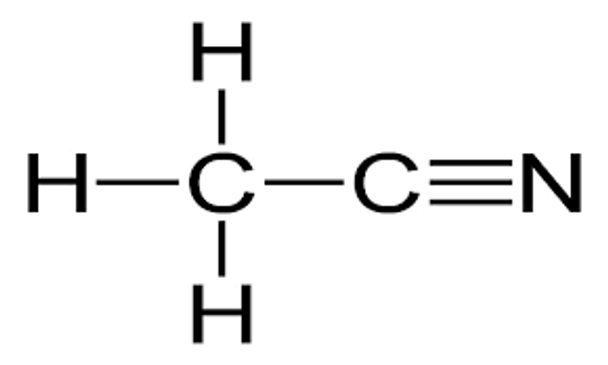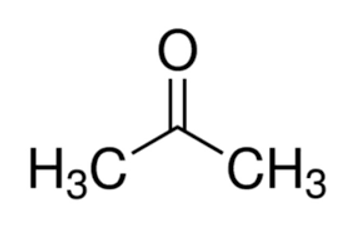Description
Acetonitrile, ≥99.5%, ACS reagent, 4x4L
Synonym(s):
ACN, Cyanomethane, Ethyl nitrile, Methyl cyanide
Linear Formula:
CH3CN
CAS Number:
75-05-8
Molecular Weight:
41.05
Beilstein:
741857
EC Number:
200-835-2
MDL number:
MFCD00001878
PubChem Substance ID:
24867381
PROPERTIES
grade
ACS reagent
Quality Level
200
vapor density
1.41 (vs air)
vapor pressure
72.8 mmHg ( 20 °C)
Assay
≥99.5%
form
liquid
autoignition temp.
973 °F
expl. lim.
16 %
technique(s)
solid phase extraction (SPE): suitable
impurities
≤0.3% water
≤0.6 μeq/g Titr. base
≤8 μeq/g Titr. acid
evapn. residue
≤0.005%
color
APHA: ≤10
refractive index
n20/D 1.344 (lit.)
bp
81-82 °C (lit.)
mp
−45 °C (lit.)
solubility
water: soluble
density
0.786 g/mL at 25 °C (lit.)
format
neat
SMILES string
CC#N
InChI
1S/C2H3N/c1-2-3/h1H3
InChI key
WEVYAHXRMPXWCK-UHFFFAOYSA-N
Acetonitrile (MeCN), an aliphatic nitrile, is a colorless liquid with a characteristic odor. MeCN has low viscosity, high elution strength and is highly miscible in water. It is widely used as a solvent and intermediate in organic syntheses and is transparent to UV-visible light, making it highly applicable in spectrophotometric and fluorimetric techniques. It also plays a major role as an extractant medium in liquid-liquid extraction, solid-phase extraction or microextraction.
Application
Acetonitrile may be used as solvent in the following processes:
- Organic synthesis
- Liquid-liquid extraction, solid-phase extraction or microextraction.
- Spectrophotometric and fluorimetric techniques.
- Electrolytes in lithium-ion batteries
- Determination of pKa values of organic superbases using the isodensity polarization continuum model (IPCM).
Features and Benefits
ACS solvents meet or exceed the high standards of the American Chemical Society (ACS) ,with test specifications that are specialized to every compound. According to the American Chemical Society, ACS reagent grade implies that it is a substance of sufficient purity to be used in most chemical analyses or reactions.
SAFETY INFORMATION
Pictograms
GHS02,GHS07
Signal Word
Danger
Hazard Statements
H225 - H302 + H312 + H332 - H319
Precautionary Statements
P210 - P280 - P301 + P312 - P303 + P361 + P353 - P304 + P340 + P312 - P305 + P351 + P338
Hazard Classifications
Acute Tox. 4 Dermal - Acute Tox. 4 Inhalation - Acute Tox. 4 Oral - Eye Irrit. 2 - Flam. Liq. 2
Storage Class Code
3 - Flammable liquids
WGK
WGK 2
Flash Point(F)
35.6 °F - closed cup
Flash Point(C)
2.0 °C - closed cup
Personal Protective Equipment
dust mask type N95 (US), Eyeshields, Gloves





